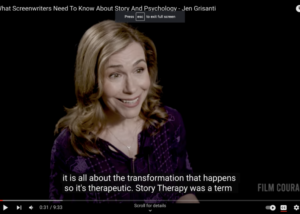The Martian is an extraordinary feel good film that really takes you into the idea that anything is possible if you focus on a desire, take action, don’t let the setbacks bring you down and always move forward and believe. It takes the idea of being positive to a whole new level. The Martian’s success at the box office is a sure sign that this type of story appeals to the masses. We all want to believe that we can achieve the dream despite the odds. It shows you that the underdog holds a place in all of our hearts. When the focus on the outcome is clear, it is truly amazing to see what can transpire even in what appears to be an insurmountable situation. This story takes achieving the dream to a whole new height. It is universal. It is accessible. It will make you feel like you can accomplish anything if you put forth a plan in action.
I was fascinated by this story. Drew Goddard wrote the screenplay. My first thought was that it is similar to Gravity that was written by Alfonso Cuaron and Jonas Cuaron. Both films started with a very powerful trigger and dilemma. In The Martian, the trigger was when Astronaut Mark Watney (Matt Damon) is thought to be dead after he is hit in the middle of a storm and his crew leaves him on Mars. His dilemma is that he has to figure out how to survive until there is a return visit. He knows that this won’t be for 4 years. His pursuit is to do the math and figure out how to make food and create an environment that will allow him to survive. In Gravity, Dr. Ryan Stone (Bullock), a medical engineer on her first shuttle mission with veteran astronaut, Matt Kowalsky (Clooney) must face disaster when their shuttle is destroyed and they are left alone in space. The dilemma is clearly to find a way to survive despite the odds. The pursuit is to make it back to earth. In both films, I think that we knew what the outcome would be, but being part of the journey and learning what it took to get there is why we go along for the ride. We want to be able to see what heroes do to get over their hurdles. We want to learn how to be the hero in our own life and to be able to get past what appear to be insurmountable obstacles.
In stories like these, we know that the pursuit feels unattainable. The fascinating thing in The Martian was that the science was simplified and we were able to understand some of the choices that Matt Watney’s character had to make in order to survive. His tactics were so logical. His character remained incredibly optimistic for the majority of the journey despite the odds, the obstacles and the stakes that he faced. There was so much emotion that came from seeing his drive and watching his belief. This is such a strong message for everyone who faces a situation where it seems like “all is lost” and the chances of moving through it seem unattainable. By watching the actions that Watney takes and seeing the obstacles that he is able to overcome, we can apply the same thought to our own lives. What if we took optimism and determination and used it to fuel our pursuits? Usually, our fuel is the pain of knowing what the worst that can happen is if we don’t pursue our dreams. What if we started focusing on what the best is that can happen and believe in this possibility? How could this approach change our lives?
It also comes down to the questions that we ask ourselves. In Gravity, it felt like the question being debated was “Do I want to live or die?” This stemmed from a deep wound that happened in the past with the loss of Ryan’s child. In The Martian, we know that Watney wants to live. Part of what is fueling this is that he knows his crew is going to feel like they made a mistake. He does not want them to feel this. With Watney’s character, more of what is being debated is; can he use his resourcefulness, knowledge and optimism to attain the outcome he wants. Both situations are being fueled by emotion and desire. When you understand how to tell a story where we fully feel the emotion that is fueling the desire, you attain an outcome that appeals to the masses.
It is interesting how the real life story of the author of the book that the film is based on, Andy Weir, has parallels with what could appear to be an insurmountable goal. After dropping out of college and getting rejected for his first two books, Andy went back to working in computers. He figured that with the Internet, he could do writing as a hobby. What he produced was The Martian. The Martian was Andy’s first published book. He self-published it when he couldn’t get a publisher. It sold really well on Amazon. When it started doing well, it got on Amazon’s bestseller list. Random House approached him. This led to him landing an agent and getting a publishing deal. The film followed this.
The insurmountable goal that gets attained is what inspires all of us to believe that anything is possible. This is why these stories work; they make the attainment of the dream seem possible.






